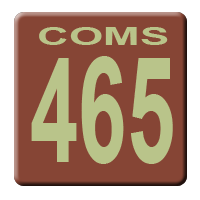Description
This undergraduate seminar addresses recent innovations in computer-mediated communication (CMC), providing students with the following:- Critical overview of the significant technological developments in computers, digital media, data networks, and information systems
- Facility with the important questions, issues, and problems that shape contemporary debates and conversations about CMC
- Knowledge of the influential individuals and organizations that define the field and help shape our increasingly technologically dependent society.
Who Where When
Location: DuSable Hall 218
Time: MW 3:30-4:45pm
Instructor: Dr. David J. Gunkel
Department: Communication
Office: Reavis 112
Office Hours: MW 1:00-2:00 & by appointment
Email: dgunkel@niu.edu
Texts & Resources
- Paul E. Ceruzzi. Computing: A Concise History. The MIT Press, 2012. ISBN: 9780262517676
- David J. Gunkel. Of Remixology: Ethics and Aesthetics After Remix. The MIT Press, 2016. ISBN: 9780262033930
- David J. Gunkel. Gaming the System: Deconstructing Video Games, Game Studies and Virtual Worlds. Indiana University Press, 2018. ISBN: 9780253035721.
These three texts are required and must be procured by all students enrolled in the course. In addition to these traditional print materials, we will employ a number of on-line texts. These materials are indicated on the course calendar and are required reading.
Objectives
Students will learn and become proficient with the following:- Theory & Concepts - Students will know the terminology, fundamental texts, and basic concepts of computer-mediated communication. They will be able to talk the talk of CMC and feel confident discussing its social, political, and philosophical aspects.
- Technology & Skills Development - Students will learn and develop practical skills with CMC technology. They will learn to employ the core technology of the web, Hypertext Markup Language (HTML), to create basic web pages and Internet applications.
- Critical Thinking & Information Literacy - Students will practice critical evaluations of texts, media, and technology. They will learn how to question information, assess its importance, and communicate their findings.
